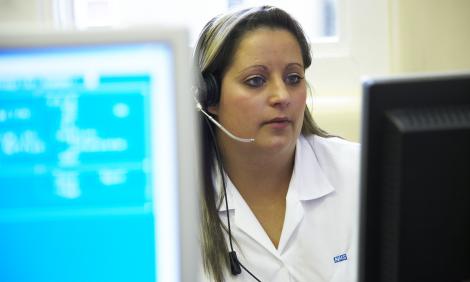Receptionist
Receptionists are often the first person our patients see. They use customer service and admin skills to welcome people to a hospital, health centre, clinic or NHS headquarters.
"I have had plenty of support and now I feel confident sorting out queries. It’s nice to know you’ve helped someone."
Read Shamina's story
Working life
As a receptionist, you're often the first person a patient meets when they go to a hospital, clinic or health centre. You'll:
- book patients in for appointments
- enter patients’ details onto IT systems
- direct patients where to go within the department or health centre
As well as dealing with patients face-to-face, receptionists often:
- answer phones, sometimes directing calls to other staff through the switchboard or phone system
- book appointments by phone
- answer queries from patients and other staff
Patients and their relatives can be nervous or upset when they visit a hospital or clinic so as a receptionist, you may have to calm them down or reassure them. Some receptionists may combine the job with other admin duties, such as:
- filing
- chasing up reports
- photocopying
- inputting data
- ordering stationery
- word processing
Receptionists work with clerks, health records staff and other admin staff. Depending on where you work, you'll have contact with healthcare professionals such as GPs or nurses. If you work in a specialist clinic or in a health centre you may also deal with, for example, podiatrists, physiotherapists and occupational therapists.
Pay and benefits
As a receptionist you would typically be paid at Agenda for Change band 2 or 3. Receptionists work standard hours of around 37.5 a week. Some staff may work shifts, which could involve nights, early starts, evenings and weekends.
You’ll also have access to our generous pension scheme and health service discounts, as well as 27 days of annual leave, plus bank holidays, which increases the longer you’re in service.
Entry requirements, skills and interests
There are no set entry requirements to become a receptionist. Employers usually expect good literacy, numeracy and IT skills. They may ask for GCSEs or equivalent qualifications. Employers often ask for relevant work experience. Even where this is not specified, it would be an advantage if you have worked in an admin or customer service role.
Personal Characteristics
Receptionists need to:
- be friendly and welcoming
- be patient and understanding
- follow instructions and procedures
- work accurately and methodically
- work in a team but use their own initiative
- work with all types of people
- deal with people who may be angry or upset
- be confident using the phone
Skills required
- organisation skills
- good communication skills
- IT skills
- excellent customer service skills
Training and development
You will get the training you need to do the job. This includes an introduction to the department, how to use the IT and phone equipment and the procedures to follow. You may also have training in customer care.You may be offered the chance to take qualifications such as NVQs or those from:
- Association of Medical Secretaries, Practice Managers, Administrators and Receptionists (AMSPAR)
- British Society of Medical Secretaries and Administrators (BSMSA)
Some receptionists become members of AMSPAR or BSMSA. Both AMSPAR and BSMSA offer training, online forums and newsletters so staff can network with others doing the same type of work.
Where the role can lead
With further training and qualifications you could consider supervisory and managerial posts higher bands. You could become a team leader, coordinating the work of a team of reception and allied staff. Latee in your career, you could become a manager, responsible for the staff in a broader department. Some receptionists move into specialist roles such as medical secretary or PA. Others move into areas such as finance or HR. You may also have the opportunity to move into informatics, specialising in electronic data, or into IT.





